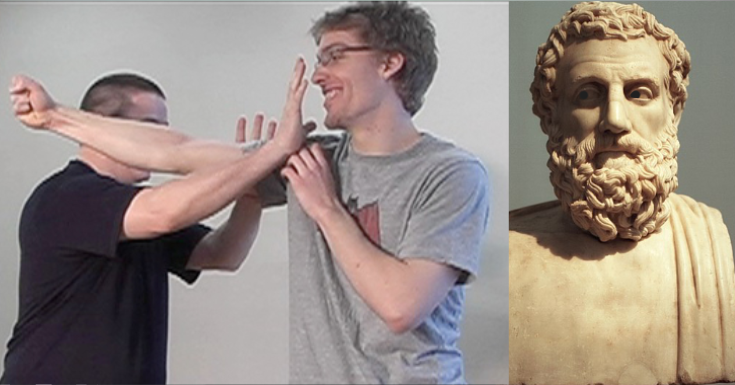
In part of the chorus in Agamemnon, the Greek tragedian, Aeschylus (circa 525 BCE – 456 BCE) writes the following
“Mortals are set on the path of wisdom,
bound by holy ordinance to pay, with suffering, for their education.
Even in our sleep,
the relentless pain
that we try in vain to forget
falls drop by drop upon our hearts
until, despairing and unwilling,
we are dragged toward wisdom,
through awful divine grace.”
– Aeschylus (the chorus in Agamemnon)
…or as I like to say,
We daily bang our heads against the wall
percussive divination ’til we fall
and in our aching sleep upon the floor
a dream reminds us of the frickin’ door.
– from “Paraphrasing Aeschylus” by Ian Sinclair
It is a common error for martial artists to focus on the enemy’s strength, and to confront it head on. This is the error that one of my teachers called, “Bulls butting heads.” I liken it to standing on the railway tracks in order to confront the oncoming train, when we know that it would be so much more practical to get off the tracks entirely, or to buy a ticket and climb aboard the train.
This theme is replayed repeatedly throughout our lives. It doesn’t seem to matter how many times we learn lessons this way, the pedagogy remains the same. The Dunning Kruger effect applies to everyone, always, no matter how intelligent or how experienced. We suffer for our foolishness until we become wise. And then we suffer different foolishness until, hopefully, we become wiser.
Is there an easier way to learn?
Is there a way to become more efficient about it so that we minimize the brain damage caused by the acquiring of wisdom?
I don’t know. I will try to remember to let you know if I find one.
The important thing is that we should remember the door after we wake up. We should make a note of it, so we can save ourselves the headaches and stop banging our heads against the wall.
In martial arts classes, it is normal for students to learn and practise blocking. But the best fighters know that blocking in a real fight is actually a waste of time. It is better to simply be where the attack isn’t. The blocking helps student to map out vectors in their minds so they can learn to avoid and intercept instead of blocking.
Likewise, our errors in our daily lives can help us to map out the shape of the problem that we should really be able to avoid.
The warrior learns that we shouldn’t fight against the opponent. We should find the part of them that wants to lose, and then we choose whether or not to let them lose.
The same principle applies internally. We should not be fighting against ourselves. We should find the parts of us that want to succeed, and then focus on facilitating the success.
We are wise to be aware of the obstacles, but only so that we can see the way around them. Our awareness of the wall serves to direct us toward the door. We hope to never hit the same part of the wall too many times.

Comments are closed.